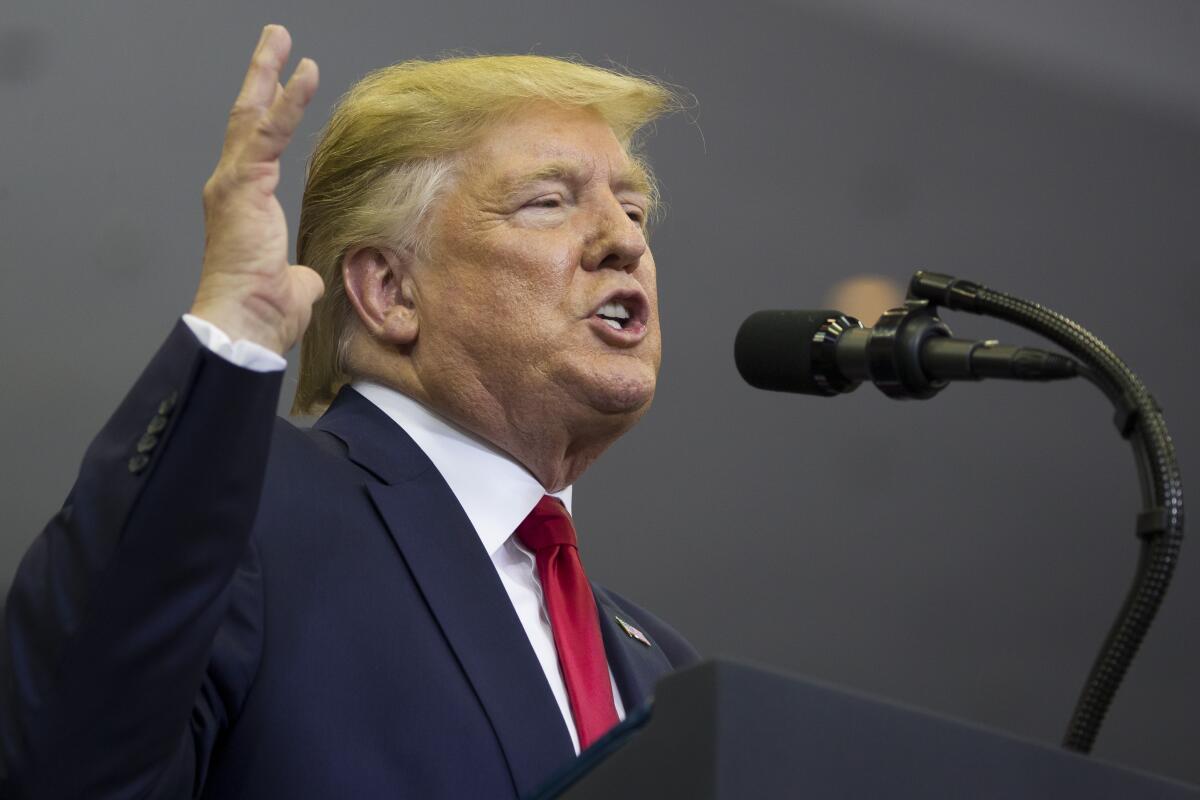Op-Ed: How autocracy takes hold in Trump’s America

Donald Trump is a few steps from becoming a new kind of autocrat — an elected one.
The typical paths to autocracy used to be through revolution or military coup. No longer. Today’s strongmen — Recep Tayyip Erdogan of Turkey, Viktor Orban of Hungary, Vladimir Putin of Russia, Rodrigo Duterte of the Philippines and others — came to power through elections and then used the institutions of government to subvert democracy and expand their own powers. Trump regularly praises the current batch of autocrats and clearly longs to rule as they do.
How could an elected autocracy take hold in the United States? After all, we have three branches of government, with built-in checks and balances. But these days, it is not so clear that America’s constitutional framework could readily repel Donald Trump’s autocratic impulses, especially when supported by the Republican Senate under Mitch McConnell.
Trump clearly admires foreign strongmen who have been able to dismantle democratic institutions and amass executive power. He praises them not because their policies are compatible with American interests and values, but because they repudiate those values with impunity. Trump and his allies in Congress, and potentially the Supreme Court, are laying out a path that would make it possible for him to emulate the authoritarians.
The impeachment process has shown that Republicans in Congress have no interest in being a check on this president, whether in substance or process.
McConnell announced from the start that the Senate would not be impartial in any impeachment trial and that he would act in “total coordination” with Trump’s counsel. Lindsey Graham, chairman of the Senate Judiciary Committee, has declared that he has already made up his mind and has no intention of being “a fair juror.” Last week, McConnell announced that the impeachment trial would begin without a decision on witnesses. These positions mock the oath to render “impartial justice” that all senators will take at the impeachment trial.
As for the Supreme Court, a moment of truth is approaching. The court has agreed to hear Trump’s appeal of the ruling of a three-judge panel of the 2nd Circuit Court of Appeals holding that he must comply with subpoenas for his personal and corporate tax records. During arguments at the appellate court, Trump’s lawyer, William Consovoy, argued that Trump enjoyed absolute immunity from criminal prosecution or investigation as president, even if he shot someone.
With two Trump appointees — Neil M. Gorsuch and Brett M. Kavanaugh — now on the Supreme Court, it is possible that the court’s conservative majority will vote to shield a conservative president and accept his far-reaching claims of executive immunity. Such an outcome would further diminish the ability of the judicial branch to check executive powers and conduct.
These developments and strategies mirror what authoritarian leaders abroad have used to enlarge and entrench their powers. They almost invariably target the three key institutions that can hold them accountable as they move to consolidate power: independent courts, a free press, and civil society organizations.
In the Philippines, prominent journalists have been arrested after publishing reports critical of Duterte. He has also referred to reporters as spies and warned that they are not exempt from assassination in a country where extrajudicial killings encouraged by Duterte have reached more than 7,000.
In Turkey, Erdogan has virtually eliminated independent news media; Turkey has jailed more journalists than any other country in the world. Erdogan has also brought the judiciary firmly under his government’s control. In Hungary, Orban has eviscerated the nation’s Constitutional Court, brought the rest of the judiciary under his party’s control, and put nearly all independent media outlets out of business. In Vladimir Putin’s Russia, journalists and opposition politicians have been jailed or assassinated and news media have been brought firmly within the Kremlin’s grip.
Each of these authoritarians got into office through elections and used the powers of the state to undermine democratic institutions and erode mechanisms of accountability.
According to global measures compiled by the Varieties of Democracy project and Freedom House, scores for the health of the three key accountability mechanisms have declined in America since Trump’s election, with the greatest erosion occurring in “political attacks on the judiciary” and “harassment of journalists.” The falling scores clearly reflect Trump’s derision for judges and courts that have ruled against him and his relentless attacks on news organizations, undermining confidence in both the judiciary and the press.
In fact, the United States is among the 10 countries showing the most dramatic declines in relevant measures since 2016. The overall decrease places the United States in the company of notorious democratic backsliders like Nicaragua, Poland, and Hungary.
These indicators are not irreversible, but they offer alarming signs of where we may be headed. With the Republican Senate on a path of blind support for Trump and a Supreme Court that may accept his claim of absolute immunity from any kind of investigation, the legislative and judicial branches appear to be unable or unwilling to exercise their constitutional duty to check the presidency. And now, after three years in office, Trump seems even less restrained by the norms of presidential conduct that were guard rails for previous occupants of the White House.
Trump and his enablers in Congress are clearing the path for autocracy in America. Will enough Americans awaken to the danger before it is too late?
Wayne Sandholtz is a professor of international relations and law at USC.
More to Read
A cure for the common opinion
Get thought-provoking perspectives with our weekly newsletter.
You may occasionally receive promotional content from the Los Angeles Times.










